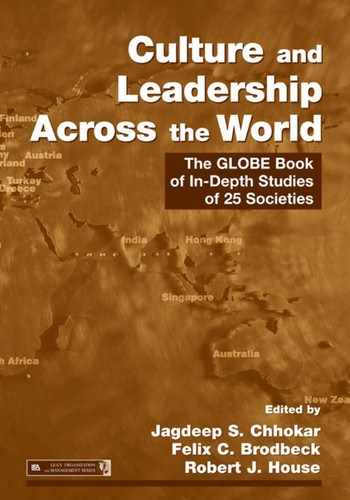![]()
EASTERN EUROPE CLUSTER
The Eastern Europe cluster in the GLOBE Research Program consisted of Albania, Georgia, Greece, Hungary, Kazakhstan, Poland, Russia, and Slovenia. Only two of these countries, Greece and Russia, are represented in this volume.
The Eastern Europe cluster scored high on Assertiveness, Gender Egalitarianism, and In-Group Collectivism. Its scores on Humane Orientation, Institutional Collectivism, and Power Distance were in the middle range. It scored low on Future Orientation, Performance Orientation, and Uncertainty Avoidance (House et al., 2004).
An outstanding leader in Eastern Europe would be one who combines Team Oriented leadership with Charismatic/Value Oriented leadership, displays fairly high levels of Autonomous leadership, and is also capable of Self-Protective behaviors. The range of variation between the countries of the cluster is quite varied, for example, slightly positive and strong positive endorsement of Participative leadership, to neutral to positive endorsement of Humane Orientation leadership.
There are strong differences between Greece and Russia, the countries represented in this volume. However, high Power Distance and high Family and Group Collectivism seem to be characteristic of this cluster. Most of the countries in this cluster faced significant challenges in the recent past during the transition from communism to market-based economies (Bakacsi, 2002).
REFERENCES
Bakacsi, G., Sandor, T., Andras, K., & Viktor, I. (2002). Eastern European cluster: tradition and transition. Journal of World Business, 37, 69–80.
House, R. J., Hanges, P. J., Javidan, M., Dorfman, P. W., Gupta, V., & GLOBE Associates. (2004). Culture, leadership, and organizations: The GLOBE study of 62 societies. Thousand Oaks, CA: Sage.
